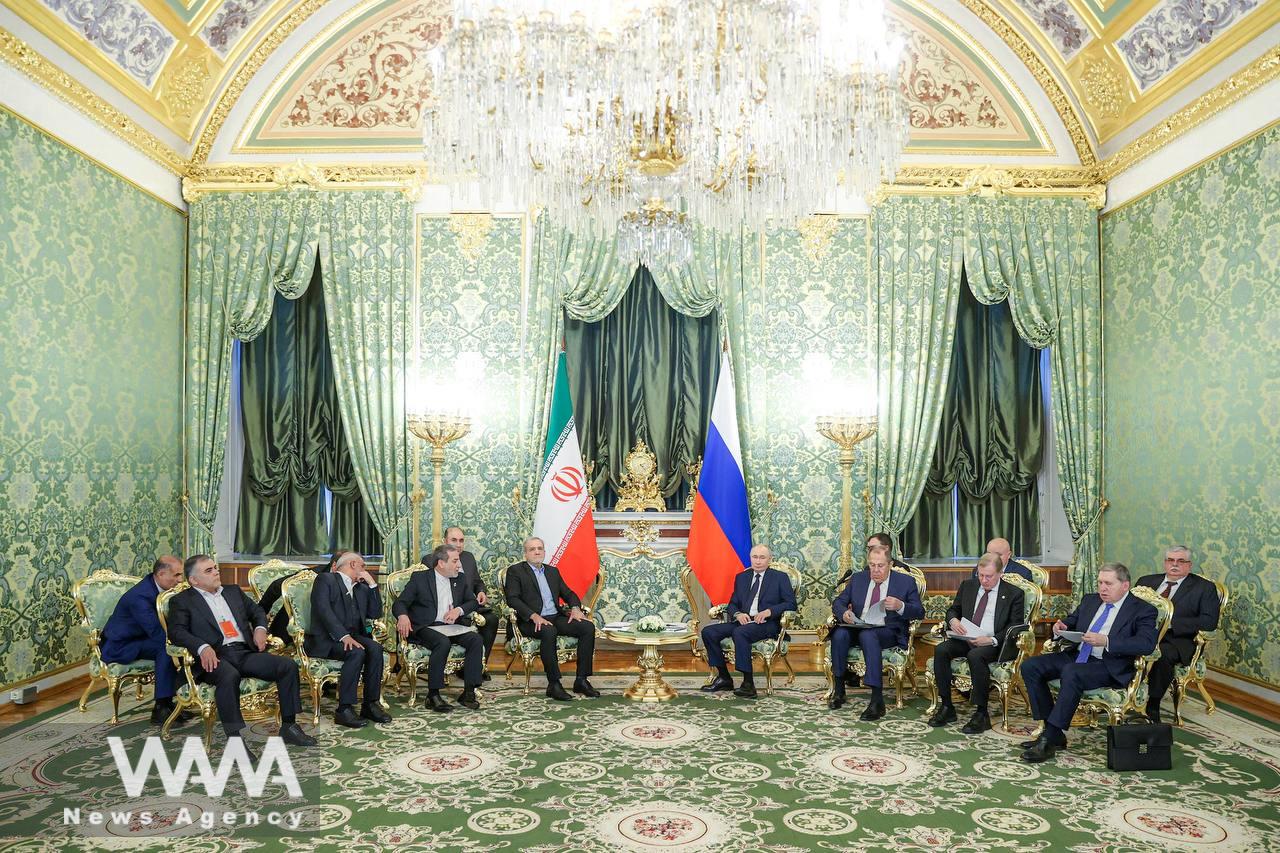Iran and Russia: An Alliance to Shape the Future of the World
WANA (Jan 18) – “We are moving toward a tomorrow where Iran and Russia’s cooperation sends a new message to the world about the global order—not only regionally but on a global scale.”
This statement succinctly encapsulates the essence of the comprehensive strategic agreement between Iran and Russia—a pact that is not just a routine document but a declaration of intent by both nations to redefine power dynamics in the international order.
Previously, Iran’s Deputy Foreign Minister Abbas Araqchi highlighted in a note for the Russia Today media outlet that the 20-year agreement between Iran and Russia is not merely a political document but a roadmap for the future.
#Putin and #Pezeshkian signed a comprehensive strategic partnership agreement between #Russia and #Iran. pic.twitter.com/fU8d7B1aK6
— WANA News Agency (@WANAIran) January 17, 2025
This document goes far beyond a simple economic agreement. It encompasses a wide range of commitments, programs, and areas of cooperation. According to senior Russia affairs expert Mahmoud Shouri, the most significant aspect of this pact lies in its emphasis on expanding collaboration across all dimensions: political, military, economic, cultural, and social. For the first time, the two nations openly declare their intent to forge a long-term and stable relationship, not merely as a tactical alliance but as a partnership based on mutual friendship and shared interests.
Russian President Vladimir Putin also emphasizes the importance of infrastructure projects, such as the North-South Corridor. This corridor not only facilitates trade between Iran and Russia but also aids in boosting both nations’ exports to global markets.
One of the key messages of this agreement is the independence of Iran and Russia in the face of Western pressures. Putin confidently stated: “If external obstacles arise to hinder our economic cooperation, we will overcome them.”

Iran-Russia Cooperation: A Step Towards Countering the U.S. Unipolar Order
WANA (Jan 17) – In today’s world, where the pace of political, economic, and international developments is accelerating, collaboration among nations is no longer a mere choice but a necessity to address complex global challenges. The relationship between Iran and Russia is a prime example of such convergence—a bond that, in recent years, has evolved […]
This pact ensures that:
Iran and Russia will not join third-party countries’ unilateral sanctions.
Independent payment infrastructures will be developed to reduce reliance on Western financial systems.
Military-technical cooperation will continue to guarantee global security.

Russian President Vladimir Putin and Iranian President Masoud Pezeshkian meet in Moscow, Russia January 17, 2025. Handout / WANA News Agency
Highlights of the Agreement
The agreement covers a comprehensive range of programs across multiple sectors, including military, cultural, and more. Key points include:
1. Mutual support against external threats: If one party is attacked, the other will refrain from assisting the aggressor.
2. Respect for Iran’s territorial integrity: Explicit recognition of Iran’s sovereignty over the three Persian Gulf islands.
3. Joint military exercises: Plans for coordinated military activities between Moscow and Tehran.
4. Arms control and non-proliferation: Cooperation to maintain international security and prevent the spread of dangerous weapons.
5. Countering negative propaganda: Media collaboration to combat misinformation and influence public opinion.
Iranian President: The #US has imposed #sanctions on Iran and Russia as part of its unilateralism.#Iran, #Russia, and #China can counter the U.S. by expanding economic cooperation and strengthening shared markets. Trade is our top priority. pic.twitter.com/b1Dqk0NMSP
— WANA News Agency (@WANAIran) January 17, 2025
One of the most debated issues surrounding the pact is the absence of a nuclear umbrella clause. Despite the hopes of analysts like Alexander Dugin, who speculated that Russia might provide nuclear defense to Iran in the Persian Gulf, no such provision is included in the agreement.
Critics, both domestic and international, have attempted to portray this agreement as contradictory to Iran’s negotiations with the United States. However, the reality is that the Islamic Republic is now in a position to simultaneously signal readiness for dialogue and maintain its robust military stance.
Interestingly, the comprehensive strategic agreement with Russia was signed by Iranian leaders who, until the same day, faced criticism for supposedly signaling negotiation to the U.S. Even more strikingly, the agreement was finalized just as Donald Trump was preparing to enter the White House, sending a clear message to Washington:

Baghaei: Close Cooperation with Russia to Maintain Regional Stability and Security
WANA (Jan 17) – Iran’s Foreign Ministry Spokesperson, Esmail Baghaei, stated that the Islamic Republic of Iran supports all efforts to restore and preserve peace and security in the region and maintains close communication with its Russian counterparts in this regard. Growing Importance of BRICS and SCO Baghaei emphasized the increasing significance of BRICS […]
Iran wields significant leverage and is no longer a nation dependent on the West from a position of weakness.
As Leonid Slutsky, Chairman of the Russian State Duma’s International Affairs Committee, stated: “Both Russia and Iran oppose U.S. hegemony, a unipolar world, and the collective West’s attempts to impose its policies, illegal sanctions, and interference in other countries’ internal affairs. The cooperation between Russia and Iran is deeply rooted and serves as a genuine example of a partnership based on mutual respect.”

Araghchi: The Nature of the Iran-Russia Treaty is Economic
WANA (Jan 18) – Iran’s Minister of Foreign Affairs stated that the Comprehensive Strategic Partnership Treaty between Iran and Russia encompasses all aspects of bilateral relations, emphasizing that the treaty’s primary nature is economic. He noted that it addresses various economic sectors, including trade, tourism, transportation, energy, and other related areas. Seyyed Abbas Araghchi, […]
This agreement heralds an era in which cooperation, friendship, and mutual respect replace confrontation and imposition.
“We are building a bridge that transcends the past, moving toward a sustainable, progressive future rooted in shared interests.”













